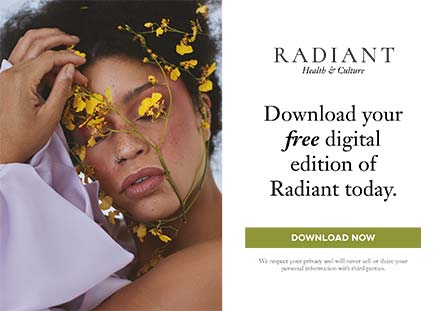How Kinorah Awini of Telande World is Bringing African Food to the World Stage
By Chinyere AmobiPublished: January 29, 2019

Radiant Health sat down with content developer and food blogger Kinorah Awini, who at just 26 years of age is CEO of Telande World, a Ghana-based community of food lovers dedicated to changing the way African food is talked about and presented on the world stage. We chatted with Awini about her vision for the African food of the future, and why it’ll be up to us to ensure that our cuisine becomes a trending topic.
First of all, for the readers, where does the name Telande World come from?
Telande is a Kusasi word from the northern Ghanaian dialect, which means “eat with me.”
How did you get started in food preparation, blogging, and branding?
My passion for food got me into food blogging and I quickly realized African food is the least talked about food in the world. So, I tried to figure out why we’re last on the list. In doing so, I discovered it’s not that our food doesn’t cut it or tastes terrible, but rather due to the poor presentation and fewer African food bloggers in the food industry. So, I took it upon myself to be the first food blogger with the mission to rebrand the presentation of our African foods and ingredients to reach international standards.
Take us into your journey to “rebrand the presentation of African foods and ingredients.” In what ways do you believe Telande World achieves this?
African food is one of the most diverse and complicated cuisines in the world. Yes, there are a lot of similarities when it comes to ingredients in every region, but there are vastly different cooking methods, procedures, and flavors between the countries. When we use West Africa as an example, every country has a unique meal, but when it comes to the ingredients, they are all pretty much the same.
Rebranding African food is not easy, because most people find it difficult to accept change. The meals we grew up eating were mostly starch based and served as soups, stews or sauces, presented in large portions. So, when an individual decides to change things out of the blue by saying “let’s cut down the carbohydrates and substitute them with vegetables, or incorporate more healthy ingredients,” it tends to raise eyebrows.
I believe with the aid of my platform Telande World, many Africans are now accepting the importance of good and healthy food. We are not cutting out African food, but rather introducing healthier substitutes and twists to our beautiful delicacies for our generation to call their own.
What is special or unique about the ingredients Africans use for traditional cuisine?
I think what makes our ingredients unique is the way we use it. Take locust beans, for example; this particular ingredient has a foul smell, but when cooked it gives so much flavor to soups and stews. Another example could be yam or cassava, and how we boil it or pound it into fufu. There are so many reasons why African ingredients are special or unique in our kitchens.
The shift in Africa towards more Westernized food has coincided with increases in diabetes and obesity in many countries. Why do you think Africans are abandoning their traditional foods?
This question touched my heart! I personally feel it’s a very serious problem we are all taking lightly. I think it all boils down to the presentation: all these Western foods look appealing, and to be trendy people want to go to a restaurant and order a burger and fries to post to social media.
I’d love to be able to order Amala and Banga at a restaurant and post it online, but the sloppy presentation can kill by sight and no amount of filter can make it look lush! I don’t think Africans are actually abandoning their traditional foods. We still consume them, but the bitter truth is that we are the problem: we don’t have a lot of fine restaurants that serve local African foods.
Most of the best local joints are on the streets or in dirty areas, and I doubt anyone would want to go on a romantic date in some unkempt food joint.
In what ways are our foods good for us, and in what ways are they bad for us?
African food in general is healthy, because we use a lot of natural ingredients for cooking and less canned foods. Where I come from—the Northern part of Ghana—we add a lot of leafy greens which are very nutritious and rich in iron.
The bad things when it comes to African foods is the starch content in our diet and the use of MSGS in our cooking. There are people who cannot cook without using seasoning cubes. Plus, the quantity of oil we use in our cooking can be outrageous. Last, but not the least, we over cook our vegetables and eat less salads.
RELATED: 11 Delicious Ways to Eat More Beans, Peas, and Lentils
What are some simple ways that we can make our cuisines healthier, without sacrificing our traditional ingredients and recipes?
Sometimes less is more. We should always make sure everything is in the right portion. We also need to cut down on the carbohydrates and oil, and add more fruits and vegetables to our diets. For example, we created a Soygusi recipe. We substituted Egusi, which has a high fat content, with soya beans, which are healthier. In another recipe, we added beetroot to rice ball swallow.
As the internet and globalization continue to expose people to different cultures and foods, what do you think is the future for African cuisines on the world stage?
The future of African cuisines is so bright, we might need sunglasses to see it. With a lot of food bloggers and foodies popping up online every day, I believe African food will definitely be hitting five star restaurants in no time. Who can say no to the likes of chicken yassa, waakye, beans and plantain, or jollof rice?
To learn more about Telande World, visit telandeworld.com.
Like what you're reading? Sign up for our free newsletter and never miss a post! Plus get a FREE digital version of our Issue No.10 with sign up.

- Black Women Share Their Experiences with High Blood Pressure - September 24, 2021
- Breast Cancer Survivor VeRitta Smith on Self Care And Finding Purpose in the Midst of the Storm - February 13, 2019
- Filmmaker Adeyemi Michael Reimagines the Immigrant Narrative While Paying Tribute to His Mother in the Captivating Short Film, “Entitled” - May 8, 2019
- For Us, By Us: BLK + GRN Puts Natural Care Products for Black Women on the Map - May 2, 2019
- Flying Over 50: How Pole Dancing Helped 58-year Old Makeda Smith Reclaim Her Life - January 16, 2019
- Playwright Ngozi Anyanwu taps into her Nigerian-American upbringing for a play on grief and healing - October 19, 2018
- Cameroonian filmmaker Cyrielle Raingou on her upcoming documentary and her country on the brink of civil war - November 7, 2018
- Are Women ‘Hormonal?’ Yes, And So Is Everyone Else! - May 23, 2019
- How The All of Us Research is Restoring Trust and Bringing A Much-Needed Diversity to Medical Research - April 10, 2019
- Getting behind youth in the fight against HIV/AIDS in Nigeria - March 6, 2019












